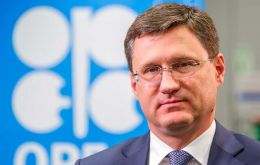MercoPress. South Atlantic News Agency
Tag: oil
-
Wednesday, January 12th 2022 - 20:54 UTC
Venezuela resumes crude exports after nine months

Venezuela's state-run PDVSA will begin exporting diluted crude oil (DCO) this week after a nine-month stoppage, it was reported in Caracas. The last time PDVSA shipped diluted crude to Asia was in April last year.
-
Tuesday, January 11th 2022 - 13:41 UTC
North Sea Oil Operators Set For Near Record Cash Flows

By Tsvetana Paraskova for Oilprice.com – UK North Sea operators will see near-record cash margins and profits this year as they will look to extend field lives amid high oil and gas prices in a “now or never” regulatory environment, energy consultancy Wood Mackenzie says.
-
Thursday, December 23rd 2021 - 20:20 UTC
Argentina's oil exports on the rise

Two shipments of Vaca Muerta crude oil carrying around 490,000 barrels each from Puerto Rosales to Porto Alegre in Brazil represent a sizeable increase in exports from the Neuquén Basin, it was reported.
-
Friday, December 17th 2021 - 21:20 UTC
Picture of canvas swimming pool to contain oil spill in Argentina goes viral

The picture of a canvas swimming pool designed for the backyard of a modest income family has been used by oil pipeline operators Oldelval to contain a crude spill of over 3 million liters in Argentine Patagonia has gone viral.
-
Thursday, December 16th 2021 - 09:22 UTC
Venezuelan exports grow 30% compared to 2020

The president of the Venezuelan Association of Exporters (AVEX) Ramón Goyo Wednesday announced a 30% increase in sales abroad compared to 2020 figures, which has allowed producers to make up for a sharp decrease in domestic consumption.
-
Thursday, December 16th 2021 - 09:00 UTC
Gov't of Haiti and transport unions reach deal over price of fuel

A memorandum of understanding was signed Wednesday between the Government of Haiti and transport unions barely a week after an increase in the price of fuels was decreed by Prime Minister Ariel Henry.
-
Tuesday, December 14th 2021 - 09:30 UTC
Ecuador decrees oil production under 'force majeure'

The Government of Ecuador has declared a situation of force majeure for the country's oil sector due to the effects of erosion in the Coca River, one of the tributaries of the Amazon basin.
-
Thursday, December 9th 2021 - 09:30 UTC
Brazil working to create a price stabilization fund for gasoline, diesel and LNG

The Brazilian government in coordination with Congress are working on the creation of a price stabilization fund for fuels in an attempt to isolate the country from the volatility of international prices of oil and refined products. The fund is to be financed mainly with a tax on oil exports, helping with stability to domestic prices of gasoline, diesel and liquid gas.
-
Monday, December 6th 2021 - 09:00 UTC
OPEC+ Expects Large Oil Glut In Early 2022

By Tsvetana Paraskova for Oilprice.com – OPEC+ anticipates the global oil market to show a worse-than-previously expected surplus in the first quarter of 2022, according to an internal report seen by Reuters, which could give the group another reason to pause monthly supply additions.
-
Tuesday, November 30th 2021 - 09:00 UTC
OPEC+ meets Thursday to decide January cuts; pre-pandemic oil output level expected to be reached in May

By Tsvetana Paraskova for Oilprice.com – All Russian oil companies have confirmed they can raise production to the levels before the pandemic if the alliance chooses to proceed with monthly increases in output, Russian Deputy Prime Minister Alexander Novak said on Monday.
